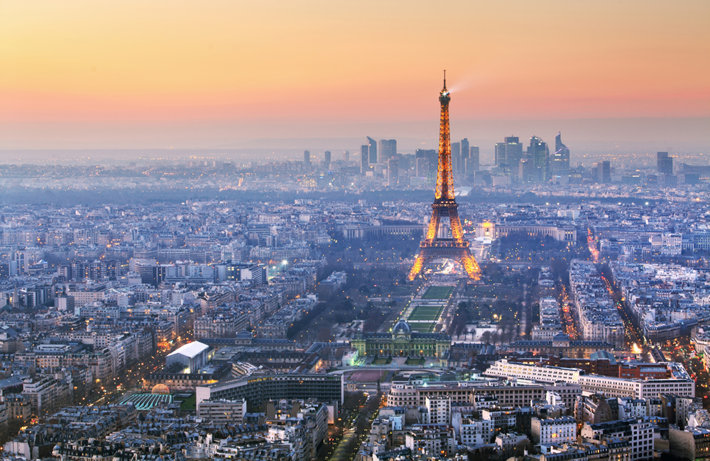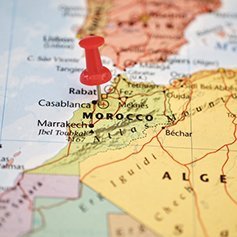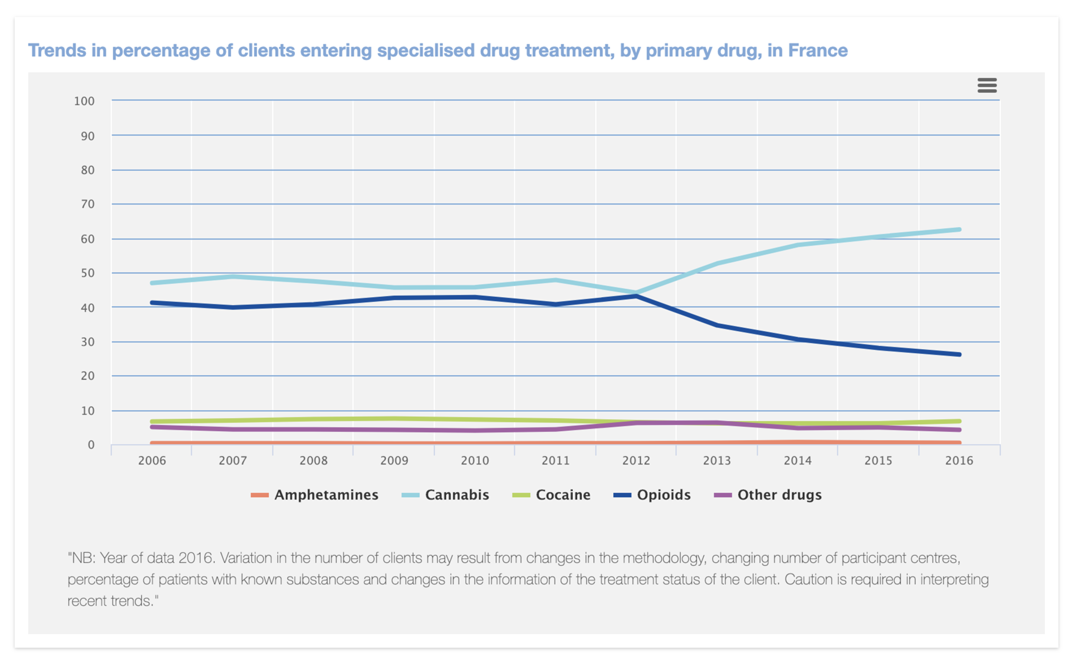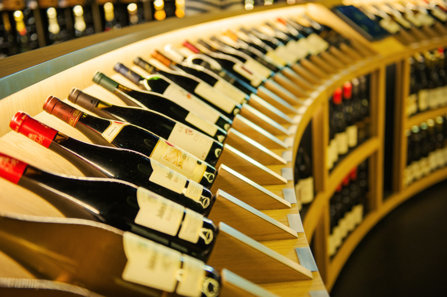Drug Addiction in France

There is no corner of the world that is completely free from the harm of drugs or alcohol. Even in Amazonian jungles, there are intoxicating plants and primitive methods of brewing alcohol. So consider a sophisticated, affluent and beautiful country like France—unscrupulous drug dealers would see this country as an excellent place to sell their cannabis, cocaine, heroin and other drugs.
As a result, France struggles with the addiction of its citizens. An estimated 230,000 are high-risk opioid users who may not be receiving treatment. A similar number are being treated for addiction to drugs like cannabis, cocaine, heroin or MDMA.
Where Are the Drugs Coming From?

Given France’s long association with Morocco, perhaps it is not surprising Morocco is France’s most prominent drug supplier. Morocco is also the world’s largest producer of cannabis resin, also called hashish. In 2016, more than 100,000 pounds of this drug were seized within France’s borders.
More than 40,000 pounds of herbal (leaf) cannabis were also seized, but that often comes from the Netherlands, Spain, Albania and domestic sources.
Cocaine is the next most-frequently seized drug, with more than 18,000 pounds seized. This drug is shipped from South America with French possessions and territories contributing to this illicit channel of commerce. For example, French Guiana on the east coast of South America is plagued by drug trafficking as well as high crime rates.
Heroin, MDMA (Ecstasy), and stimulants complete the list of major drugs being seized. While only 2,000 pounds of heroin were seized, the destructive and addictive effects of the drug increase its importance when you are considering how to save lives.
Which Drugs are the French Using?
Among French youth, cannabis use increases quickly as they reach their teens. According to one survey among 11-year-olds, very few had used the drug. By age 13, 5.6% had used it and by age 15, more than 26% had used it.
According to a different survey, 31% of 15 and 16-year-olds have used the drug—a rate nearly twice as high as the average in EU countries.
These numbers tend to decline as French citizens age.
Addiction Treatment in France
Overwhelmingly, cannabis is the primary drug sending people to rehabs. But this was not always the case. Between 2006 and 2012, opioids and cannabis were almost neck and neck for creating admissions to treatment. In 2012, they were almost tied, with opioids responsible for sending 43% of admissions to rehab and cannabis sending 44%. But then the two lines diverged dramatically.

By 2016, opioids were sending only 26% and cannabis admissions had risen to 63% of the total number.
Look at these admission figures for 2016, the most recent year for which we have statistics:
- Cannabis users entering treatment: 28,998
- Heroin users: 8,822
- Cocaine users: 3,108
- Amphetamine users: 182
It’s taking many cannabis users more than one try at rehab to get sober. Of these nearly 29,000 admissions, only 11,601 were first-time admissions to treatment.
Alcoholism in France

France is known around the world for their fine wines and other alcoholic beverages such as cognac, calvados and champagne. Indeed, the production of alcohol is inextricably tied into the image that France presents to the world. Thus, it’s been noted that the French have a hard time admitting that their alcohol products harm their citizens.
The French Minister of Health Marisol Touraine pointed out that “the wine and alcohol lobby in France is powerful and has got into people’s heads that wine is good for the health, which remains to be proven…There’s a form of denial over this.” The French average 30% more alcohol consumption than the rest of Europe.
In late 2018, their national drug agency ANSM approved the use of baclofen for the treatment of addiction to alcohol. Baclofen is a muscle relaxant that some people say causes problematic side effects. These effects include confusion, nausea, weakness, stomach pain, false sense of well-being, joint pain, slurred speech and much more. Perhaps this is not the most favorable way to help a person who is addicted to alcohol.
Alcoholism and liver disorders are not the only health problem caused by these beverages. A 2018 study of French dementia patients noted that alcohol use disorders were a major contributing factor in the majority of these cases. The researchers recommended actions to reduce alcohol consumption among the French. Of course, a person who is addicted has lost the power of choice and therefore might not be able to reduce his (or her) consumption. He needs support to quit drinking and recover not only his sobriety but his health.
Recovering from Addiction
With baclofen being given for alcoholism and the opioids methadone or buprenorphine being administered to those who were addicted to opioids, it is obviously a common belief in France that addiction can be treated with medication. But what happens if that person stops taking the medication? Will they be able to stay sober because they know how to make sober choices? Have they learned how to maintain their own personal integrity and deflect any attempts by others to make them relapse?
If they pursued their recovery at Narconon Europe, then they would have learned these life skills. The Narconon program is a holistic treatment program that focuses on helping each person rebuild a new life from the ground up.
That rebuilding takes the shape of the following steps:
- A tolerable withdrawal well supported by nutritional supplements that support detoxification plus gentle relaxation and reorientation processes
- A thorough sauna-based detox that washes away toxins left behind from years of drinking or drug use
- A series of exercises that help each person begin to leave past pain and trauma behind so they can begin enjoying a life lived in the present
- Life skills training that begins with educating each individual on how to identify and handle those people who do not support your sober survival
- More life skills training to help each person shed the guilt that weighs them down to they can recover their own personal integrity
- Finally, a training course to give a person the tools to make positive changes and choices in their life to protect their sobriety for the long term.
When these actions are done, each person then takes what they have learned and puts it to work to develop a plan to return to their homes and communities. They may need to find honest work, complete school and repair broken relationships. They take this plan home and stay in touch with Narconon staff as they implement the changes that are needed.
The result of all this work is that a person doesn’t need to rely on medications like methadone or buprenorphine. He can honestly build a sober life and meet life’s challenges with his new skills. His new life may not be easy but when you understand how to handle setbacks and make the right decisions, you can live your life on a successful upward path. And that means that drugs are simply not needed anymore.
Learn more about how Narconon helps people break fully free from drugs. Call us to find help for someone you care about.

